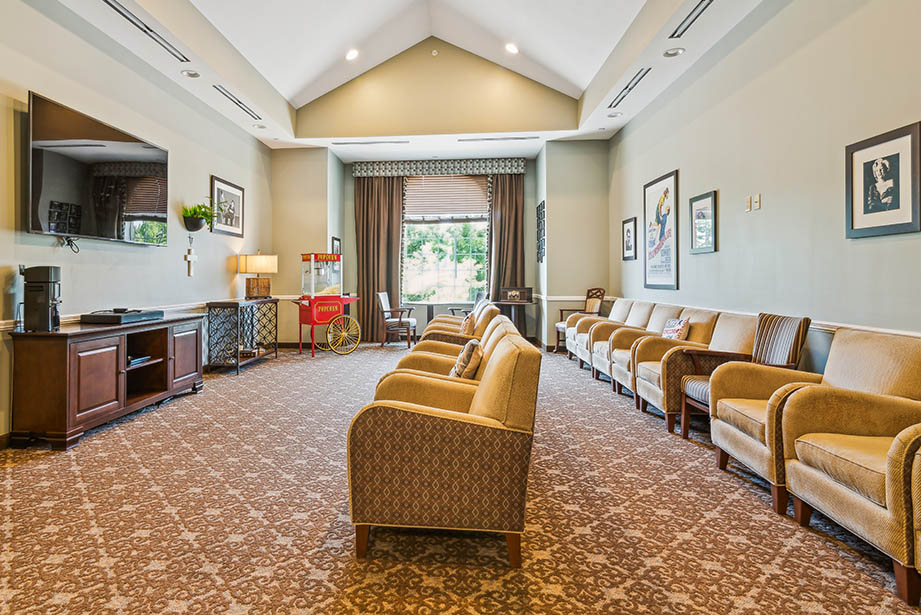Memory care is a valuable senior living lifestyle option for aging adults with dementia or one of its related conditions. Recognizing the need for specialized care can positively impact seniors and their families. A few of the signs it is time for memory care include:
- Increasing safety concerns
- Difficulty managing daily activities
- Emotional and physical caregiver strain
Whether your loved one is in the early stages of memory loss or experiencing advanced symptoms, understanding the signs and exploring supportive options is an empowering first step. Understanding how dementia can affect your loved one also highlights the benefit of memory care.
Early Signs of Memory Decline
Memory-related conditions such as Alzheimer’s and dementia often develop gradually. While occasional forgetfulness is a normal part of aging, persistent symptoms may signal something more serious.
Keeping a compassionate perspective is essential if you notice these changes in a loved one. Sometimes, these signs can reflect stress or other health conditions, so start by consulting a healthcare professional.
Forgetfulness Beyond “Just Forgetting”
Repeating the same questions, forgetting recently learned information, forgetting people they know well, or misplacing everyday items could point to a senior who is beginning to show symptoms of cognitive decline.
Difficulty Managing Daily Tasks
Each person’s daily tasks are unique, but difficulties may include:
- Trouble handling finances
- Forgetting recipes they’ve used for years
- Completing familiar household chores effectively
These can all be signs that a family should begin exploring memory care options.
Poor Judgment
As seniors experience further cognitive decline, they may exhibit poor decision-making, such as unsafe financial choices, uncharacteristic purchases, or dressing inadequately for the weather.
Withdrawal from Social Activities
Individuals who are developing dementia or Alzheimer’s might pull away from hobbies, outings, or social connections, possibly due to struggles with cognition.
When to Consider Memory Care
Knowing when to consider professional memory care can be difficult for families.
Increasing Safety Concerns
Frequent confusion, wandering off, or medical emergencies (like forgetting to turn off the stove) are strong signs that a senior can benefit from 24-hour supervision.
Difficulty Managing Daily Activities
If routine tasks—like bathing, dressing, or preparing meals—become overwhelming, the structure provided by a memory care community can be a relief.
Emotional & Physical Caregiving Strain
Being the sole caregiver can be emotionally and physically exhausting. If caregiving is negatively impacting your health or relationship with your loved one, seeking memory care ensures that both of you get the support you need.
Choosing memory care doesn’t mean “giving up.” It’s a way to provide professional, tailored support, allowing your loved one to remain safe and respected while you refocus on quality time together.
Benefits of Memory Care Communities
Memory care communities are thoughtfully designed to support individuals experiencing significant memory loss. Beyond offering safety and supervision, these communities enrich lives in unique ways.
Specialized Care
Staff members in memory care communities are trained in dementia-friendly practices, ensuring your loved one receives care tailored to their needs, including medication management, cognitive activities, and addressing behavioral changes.
Safe Environments
Features like secured outdoor spaces, monitored entryways, and easy-to-navigate layouts help prevent wandering and reduce anxiety in a memory care community.
Structured Routines
Predictable schedules for meals, activities, and rest give residents a reassuring sense of stability each day.
Opportunities for Social Interaction
Engaging activities—from art classes to music therapy to group games—encourage connection and joy, helping residents maintain a sense of purpose.
These benefits foster independence and fulfillment while surrounding your loved one with compassion and attention.
How to Choose the Right Memory Care Community
Not all memory care communities are the same. Finding the right fit requires thoughtful consideration of your loved one’s unique needs and preferences.
Evaluate the Location
Choose a memory care community that’s conveniently located for you and family members to visit regularly. Proximity makes a positive transition much easier.
Tour the Community
Visit in person to observe the atmosphere, speak with staff, and see current residents engaging in activities. A warm, welcoming ambiance is essential.
Assess Safety Measures
Ensure the community has measures like secured exits and grab bars, as well as monitored common areas. Ask how they handle emergencies like medical episodes or wandering.
Review the Staff-to-Resident Ratio
Communities with lower resident-to-staff ratios often provide more personalized and attentive care, leading to a more fulfilling experience for your loved one.
Explore Healthcare Services
Check if the community offers additional healthcare support on-site, such as physical therapy, medication administration, or visiting specialists.
The right memory care community will feel inviting, safe, and aligned with your loved one’s routines and preferences.
Planning for the Future
Recognizing the signs that it’s time for memory care is a courageous step toward ensuring your loved one’s well-being. Early intervention and support are critical to their safety, dignity, and fulfillment. Reach out to our compassionate team at The Enclave of Scarborough to discuss your specific needs and explore our community options. We’d love to book a community tour for you and your loved one so we can show you how our community can support your loved one through life’s various stages.









